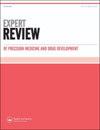Individualized management of cytomegalovirus in solid organ transplant recipients
IF 1.2
Q4 PHARMACOLOGY & PHARMACY
Expert Review of Precision Medicine and Drug Development
Pub Date : 2021-09-03
DOI:10.1080/23808993.2021.1964951
引用次数: 1
Abstract
ABSTRACT Introduction Cytomegalovirus (CMV) is an opportunistic infection that affects immunocompromised solid organ transplant patients. Defining the imbalance between host and virus factors that predispose to its occurrence can assist in individualizing the approach to CMV prevention and treatment. Areas covered In this narrative review article, we provide an up to date overview of host, pathogen, and transplant-related factors that determine the risk and outcome of CMV infection in solid organ transplant recipients. We review the role of CMV-specific cell-mediated and humoral immune status, degree of lymphopenia, degree of viremia, and the dose and type of immunosuppressive regimen in defining the risk and determining the outcome of CMV. We propose that knowledge of these factors should be taken into account in optimizing the management strategies and individualize our approach to CMV prevention and treatment in the posttransplant setting. Expert opinion The management of CMV in transplant recipients is not a one-size-fits-all strategy. We highlight the spectrum of CMV risk and outcomes in solid organ transplant recipients based on host, virus, and transplant-related factors. We provide examples on how to incorporate these factors in the implementation of optimized antiviral prophylaxis, preemptive treatment of asymptomatic infection and management of susceptible, refractory, and resistant CMV disease.实体器官移植受者巨细胞病毒的个体化治疗
巨细胞病毒(CMV)是一种影响免疫功能低下的实体器官移植患者的机会性感染。确定易导致其发生的宿主和病毒因素之间的不平衡有助于个体化CMV预防和治疗方法。在这篇叙述性综述文章中,我们提供了宿主、病原体和移植相关因素的最新综述,这些因素决定了实体器官移植受者巨细胞病毒感染的风险和结果。我们回顾了CMV特异性细胞介导和体液免疫状态、淋巴细胞减少程度、病毒血症程度以及免疫抑制方案的剂量和类型在确定CMV风险和决定结果中的作用。我们建议,在优化管理策略和个性化移植后CMV预防和治疗方法时,应考虑到这些因素。专家意见移植受者巨细胞病毒的管理并不是一个放之四海而皆准的策略。我们强调基于宿主、病毒和移植相关因素的实体器官移植受者巨细胞病毒风险和结果的谱。我们提供了如何将这些因素纳入实施优化的抗病毒预防,无症状感染的先发制人治疗和易感,难治性和耐药巨细胞病毒疾病的管理的例子。
本文章由计算机程序翻译,如有差异,请以英文原文为准。
求助全文
约1分钟内获得全文
求助全文
来源期刊

Expert Review of Precision Medicine and Drug Development
PHARMACOLOGY & PHARMACY-
CiteScore
2.30
自引率
0.00%
发文量
9
期刊介绍:
Expert Review of Precision Medicine and Drug Development publishes primarily review articles covering the development and clinical application of medicine to be used in a personalized therapy setting; in addition, the journal also publishes original research and commentary-style articles. In an era where medicine is recognizing that a one-size-fits-all approach is not always appropriate, it has become necessary to identify patients responsive to treatments and treat patient populations using a tailored approach. Areas covered include: Development and application of drugs targeted to specific genotypes and populations, as well as advanced diagnostic technologies and significant biomarkers that aid in this. Clinical trials and case studies within personalized therapy and drug development. Screening, prediction and prevention of disease, prediction of adverse events, treatment monitoring, effects of metabolomics and microbiomics on treatment. Secondary population research, genome-wide association studies, disease–gene association studies, personal genome technologies. Ethical and cost–benefit issues, the impact to healthcare and business infrastructure, and regulatory issues.
 求助内容:
求助内容: 应助结果提醒方式:
应助结果提醒方式:


